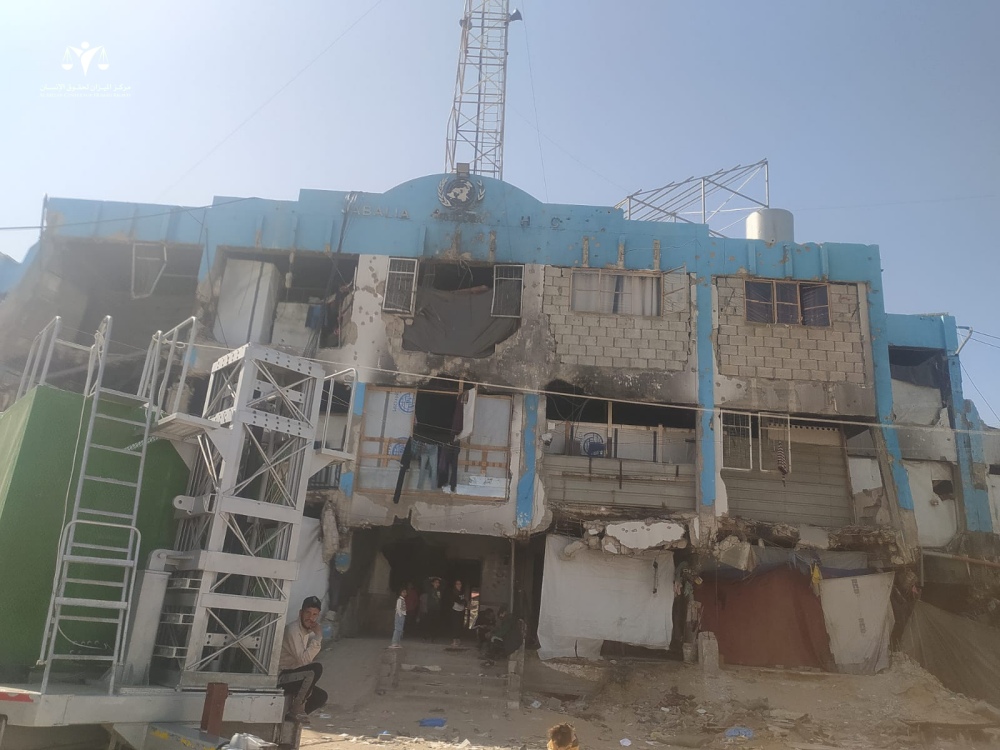بمناسبة يوم الصحة العالمي
6 أبريل 2025

يصادف الإثنين 7 نيسان/ أبريل 2025، يوم الصحة العالمي، وتركز منظمة الصحة العالمية هذا العام على صحة الأمهات والمواليد، وستدشن حملة تستمر لمدة عام بعنوان: "بداية صحية لمستقبل واعد"، وتهدف إلى تشجيع وحث الحكومات والمجتمعات على تكثيف الجهود من أجل إنهاء وفيات الأمهات والمواليد، وإعطاء الأولوية لصحة المرأة، ودعم الصحة في مرحلتي الحمل والولادة وتحسين الصحة ما بعد الولادة.
تأتي المناسبة هذا العام، وسكان قطاع غزة يتعرضون لإبادة جماعية مستمرة ومتصاعدة، إذ تتواصل الهجمات الحربية ويتواصل معها استخدام قوات الاحتلال الإسرائيلي التجويع كأسلوب من أساليب الحرب على المدنيين، حيث تفرض قوات الاحتلال حصاراً مشدداً منذ 2/3/2025، وتمنع بموجبه عمليات الإغاثة ودخول المواد الأساسية والوقود وغاز الطهي والإمدادات الغذائية والطبية اللازمة لحياة السكان.
وتكثف قوات الاحتلال من هجماتها البرية والجوية، التي تستهدف المدنيين، كما تضاعف من أوامر الإخلاء، وتجبر السكان على النزوح في ظل غياب المأوى المناسب والنقص في أعداد الخيام وعدم توفر غرف متنقلة (كرفانات)، ونقص المركبات المخصصة للنقل بسبب شح الوقود، ووفقاً لمكتب الأمم المتحدة لتنسيق الشؤون الإنسانية (الأوتشا)، ما نسبته (65%) من مساحة قطاع غزة تعتبر مناطق ممنوع فيها الحركة، أو تحت أوامر إخلاء نشطة.
وتهدد الأوضاع القائمة حياة سكان قطاع غزة جميعهم، ولاسيما النساء والحوامل والمرضعات منهن على وجه الخصوص، جراء شح المواد الغذائية الأساسية، وإغلاق المخابز والنقص في المياه، وعدم قدرتهن على توفير المواد الغذائية الغنية بالبروتينات. ويشير الجهاز المركزي للإحصاء الفلسطيني أنه من المتوقع أن يعاني حوالي (1.95) مليون شخص من مستويات عالية من انعدام الأمن الغذائي الحاد، ومن المتوقع أن يواجه آلاف الأطفال نقصاً حاداً في المواد الغذائية التي تؤثر على صحتهم ونموهم، وقد يؤدي إلى مضاعفات صحية خطيرة تشمل الفشل العضوي أو الموت، كما ستحتاج (16,500) امرأة حامل ومرضعة إلى العلاج بسبب سوء التغذية مما يؤثر على صحتهن وصحة أطفالهن، وقد يؤدي إلى مضاعفات صحية أثناء الحمل والولادة.
وفي هذا السياق أفادت رئيس قسم الأطفال والتغذية العلاجية في مستشفى العودة في مخيم النصيرات للاجئين، الدكتورة/ وصال أبو لبن، بما يلي:
" لاحظنا زيادة في الحالات التي تراجع المستشفى نتيجة سوء التغذية الحاد خلال الفترة الحالية، علماً أن النسبة انخفضت بشكل ملحوظ فترة التهدئة لكنها عاودت وتدهورت مع شح المواد الغذائية وعدم قدرة الأسر على توفير الأغذية الغنية بالبروتينات، وطرأ أيضاً زيادة في أعداد النساء الحوامل والمرضعات اللواتي يعانين من سوء التغذية المتوسط، واللواتي يعانين من الأنيميا (فقر الدم)، وهذا يؤثر على صحتهن وصحة الأجنة وعلى عملية الولادة، أوزان المواليد طرأ عليها انخفاض ملحوظ عن المعدلات الطبيعية، نحاول تقديم العلاج المتوفر لكن ونتيجة توقف إرساليات الإمدادات الطبية نواجه نقص في المكملات الغذائية والمقويات..."
وتتفاقم الأوضاع الصحية جراء استهداف المراكز والنقاط والكوادر الطبية والمستشفيات وغرف العمليات، وعدم السماح للمرضى والجرحى بالسفر لتلقي العلاج، وفي ظل العجز في الأدوية والمستلزمات الطبية والمواد المخبرية. كما تواجه وزارة الصحة تحدي في توفير وحدات الدم، حيث تحتاج إلى حوالي (8000) وحدة شهرياً لتغطية احتياجات الجرحى ومرضى الثلاسيميا، الأمر الذي يستحيل توفيره من المتبرعين داخل القطاع نظراً لانتشار سوء التغذية وفقر الدم بين السكان. وتتفاقم أزمة مياه الشرب نتيجة النقص في الوقود واستهداف مرافق المياه والصرف الصحي، بالإضافة إلى تراكم النفايات أمام وفي محيط التجمعات السكانية نتيجة عدم القدرة على ترحيلها للمكبات الرئيسية التي تتواجد في المناطق التي تسيطر عليها قوات الاحتلال وهذا يترتب عليه مخاطر بيئية وصحية كبيرة نتيجة الروائح، وانتشار الحشرات والقوارض، والأوبئة.
مركز الميزان لحقوق الإنسان، إذ يدين استمرار حرب الإبادة التي تشنها قوات الاحتلال الإسرائيلي على قطاع غزة، واستخدام أسلوب التجويع والتعطيش كسلاح، وتصاعد الاستهداف المنظم لمؤسسات الرعاية الصحية والطواقم الطبية، فإنه يؤكد على أن قوات الاحتلال تحاول إيقاع أكبر الخسائر في أرواح المدنيين لا سيما النساء والأطفال.
وبناءً عليه، يطال المركز المجتمع الدولي بالتدخل العاجل ووقف جريمة الإبادة الجماعية، ووقف سياسة التجويع، وإنهاء الحصار وفتح المعابر، والضغط على دولة الاحتلال لوقف كافة أشكال القيود والعقبات أمام الأنشطة الإنسانية التي تقوم بها الهيئات الدولية والإنسانية لإغاثة المدنيين، والسماح بمرور إرساليات الأدوية والمستهلكات والمستلزمات والوفود الطبية.
كما يهيب بالمجتمع الدولي ومنظمة الصحة العالمية والمؤسسات الصحية المحلية تكثيف الجهود من أجل إعطاء الأولية لصحة المرأة وللنساء الحوامل والمواليد، وتوسيع حجم الدعم للمنظومة الصحية وتوفير المعدات والأجهزة الطبية والمواد المخبرية واللوازم الصحية في المراكز والعيادات، وتوفير المواد الغذائية والمقويات وحليب الأطفال للمواليد.
